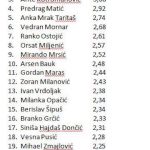Croatia increasing its international aid commitments.
In the next 15 years, Croatia will seek to significantly increase the amount of money that is sends as assistance to other countries, so that the official development aid in 2030 would reach 1.1 billion kuna, three times more than this year. The increase in funds is planned in the National Strategy for Development Cooperation 2015-2020. The document states that Croatia will “strive to continue to increase” development aid in order to “reach by 2030 the goal of spending on official development assistance 0.33 percent of gross national income”. The amount includes some of the money paid by Croatia into the common European budget and European Development Fund, which are then allocated at the EU level. Data from the strategy show that this year the development aid amounted to 390 million kuna, with an increase to 420 million kuna in 2016, reports Novi List on October 21, 2015.
According to government plans, in the next five years Croatia will continue to put emphasis on the countries of Southeast Europe. The focus will be on Albania, Montenegro, Kosovo, Macedonia and Serbia, as well as on Bosnia and Herzegovina as a so-called program country, which includes multi-year programs of development cooperation. In the area of North Africa and the Middle East, Croatia is especially interested in cooperation with Iraq, Morocco, Palestinian Authority, Syria, Tunisia and Jordan. In other parts of the world, development assistance is planned for Colombia, Myanmar, Tajikistan, Tanzania, Ukraine and Afghanistan.
In the document, the government admits that Croatia is “a relatively small donor on the world stage which is not able to compete with major global providers of assistance”. However, government believes that Croatia has certain advantages and experiences which can be offered to other countries – for example, the experience of transition from a one-party system into a multi-party system, from communism to market economy, from war to peace, and the experience of the accession to the EU. Therefore, the government believes that Croatia can contribute relatively more than countries of similar foreign policy influence and economic power.










